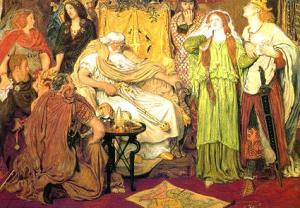(Yet another post inspired by #ShakesMOOC.) Our first class on Lear focused entirely on the complexities of 1.1, with Professor Ko spending time in his lecture exploring the ambiguities in motivation for both Lear and for Cordelia in this strange game of conditional love and inheritance that’s being played around the division of the map into separate territories.
Is Lear setting this game up as an expression of his tyrannical nature? Does it betray a sense of paternal insecurity? The onset of dementia?
Is Cordelia’s refusal to play along truly because she is so full of emotion and lacking in confident voice that she really “cannot heave [her] heart into [her] mouth” (1.1.93-94)?* Or is there more a tone of active rebellion against the game’s cruelty, a bit of a “fuck you” tone to things?**
When Lear disowns his youngest daughter, to what degree is he driven by hurt feelings and to what degree by anger?
So many choices.
One of the many strengths of this class is the attention paid to the intricacies of performing Shakespeare, the different shading and nuances that can be brought out (or not) by different performances. In that spirit, the class materials sometimes link us to different videos of Shakespeare performances and film adaptations. For this class, we were pointed to a fascinating compilation on Youtube that stacks four different performances of 1.1.84-141 right on top of one another.
I’m not a skilled enough actor to spot/name all the technical choices and subtleties going on here, but the video as a whole is a spectacular demonstration of the different tones and shades that can be brought out of a text by the acting choices.
 Yuri Yarvet and Velentina Shendrikova were surprisingly understandable to me, despite that fact that the only two words of Russian I know are “vodka” and “spasiba” (though I also heard a phrase or two of French in the middle, which was a great touch considering Russian history). Yarvet is wild haired and wild-eyed as Lear, and Shendrikova has a moment herself where she seems carried away by her own words in a way that hints at a family legacy of insanity?
Yuri Yarvet and Velentina Shendrikova were surprisingly understandable to me, despite that fact that the only two words of Russian I know are “vodka” and “spasiba” (though I also heard a phrase or two of French in the middle, which was a great touch considering Russian history). Yarvet is wild haired and wild-eyed as Lear, and Shendrikova has a moment herself where she seems carried away by her own words in a way that hints at a family legacy of insanity?
James Earl Jones started out making me think of early-onset dementia, with the way he’s kind of gazing into nothing with his first lines. But then the turn to rage had such power to it, I was kind of confused. He is strongest of the four in how he voices the assertion that he will “retain the name” (1.1.137-138) of king, and the specter of potential intra-familial violence raised when Lear points his sword at Lee Chamberlin’s Cordelia is pretty chilling.
Laurence Olivier does the best to hit on the vanity I most often see in Lear’s actions here. His tone drips with false sweetness, and his pretending almost at deafness when Anna Calder-Marshall’s Cordelia first says “Nothing, my Lord” (1.1.89) suggests that he is so over-indulged in all things that it is practically incomprehensible that anyone would say something to him he doesn’t want to hear. Olivier also does the most to indicate hurt feelings in Lear’s outburst of 1.1.110-131, but it is the hurt feelings of a spoiled, pampered child. Just look at the petulant and sulky way he tosses his “coronet” (1.1.141) onto the map pf his kingdom at the end of the clip.
Finally, Ian McKellen’s Lear is more overt in the ways he invokes the divine right of kings to rule. Look at the gestures he makes towards the divine source of his power, both when verbally smiting his daughter and when blessing Cornwall and Albany as his successors. (More potently, look at the way everyone kneels in subjugation when this Lear first reaches heavenward.) And Romola Garai’s Cordelia reminds me a bit of the flavor of Zoe Tapper’s Desdemona, trying to speak with directness and maturity, perhaps in hopes that such strength can snap her father out of his irrationality.
I’m still only at the end of Act 1 in my re-reading, so it’s too soon for me to tell which one of these four interpretations will most closely match my interpretation of the character once I’ve gotten through the rest of things. Perhaps I’ll find myself wishing for some sort of Frankensteinian combination of them all. (“I’d like a pair of Gene Tierney eyes/Try Monty’s mouth on for size/A little fuller though…“)
* All line references to the Signet Classic paperback edition of the play. Second revised edition, copyright 1998.
** It’s a simple code. Plain text w/citation=actual quotation. Italicized text w/out citation=imaginative paraphrase.
———-
Image credit: Cordelia’s Portion by Ford Madox Brown. Unaltered. Public domain.

